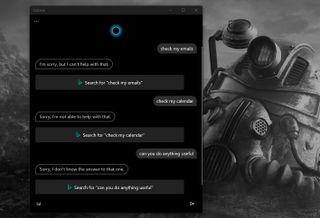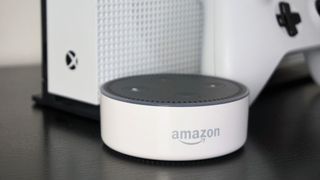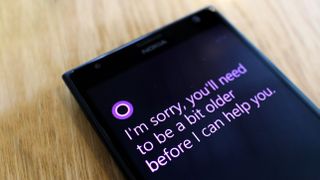The failure of Amazon's Alexa shows Microsoft was right to kill Cortana
RIP voice assistants, for now?

Microsoft Cortana, we barely knew ye.
2023 is looking to be a rough year in tech, with layoffs already hitting various major companies as forecasts predict recession almost across the entire world. A combination of inflationary effects of money printing through the pandemic, Russia's war of aggression in Ukraine, and even China's COVID-Zero lockdown policies — are all contributing to a perfect economic storm hitting practically everyone. From gas prices to food costs, we're all tightening our belts, and for the world's biggest companies, that means accepting some harsh realities about some of their more experimental departments.
Some of the biggest tech stories of this year revolved around Facebook's staggering fall from grace, with billions upon billions wiped off its market value owing to a smorgasbord of strategic and macroeconomic headwinds. The focus on its experimental metaverse saw the company rebrand to Meta and imagine a future where users sought to wear bulky VR computers on their faces to do basic tasks rather than the palm-sized pocket computers they already owned. Amazon, quite similarly, has come to terms with its own human-computer interfacing failure this year, although you probably wouldn't have realized it from how popular they are.
Surprisingly, the biggest money black hole in Amazon's portfolio appears to be its Amazon Echo speaker line. Which came as a shock to me initially, considering I own several of them. I've used an Amazon Echo to control my Xbox. I've used my Amazon Echo to interact with my Windows PC. Lots of PCs come with Alexa pre-installed these days too. Everyone I know also owns at least one of the convenient-yet-concerning privacy-busting mini-mics for everything from listening to music to turning on the lights. Yet, the division has been named as one of Amazon's biggest failures in recent times, which reminded me that, once upon a time, Microsoft also sought a piece of that surprisingly unlucrative pie.
It seems that Microsoft saw the pitfall earlier than most and got out of the game before it became a colossal eyesore within the quarterly earnings spreadsheet. But is there hope for voice-assisted systems in a world where machine learning is becoming increasingly accessible?
A brief history of Cortana

We were among the first sites to report on Cortana after Microsoft had inadvertently leaked an engineering Lumia to the public. The app "zCortana" appeared as a test app, alongside various others, as noted in my old "A brief history of Cortana" article of yesteryear. Back then, we had no idea precisely what Cortana would end up being for, but it wasn't long before it was formally announced.
Cortana was initially meant to be a simple codename, but the leak and popularity of it eventually led to Microsoft adopting it. Cortana is the name of the artificial intelligence from Microsoft's popular Halo franchise, and to name Microsoft's voice assistant after this sci-fi vision of a super artificial intellect became a symbol of the company's ambition. Microsoft even went as far as to enlist the character's voice actress Jen Taylor from the games for the U.S. version, adding excitement to the project.
Get the Windows Central Newsletter
All the latest news, reviews, and guides for Windows and Xbox diehards.
Microsoft worked with partners to integrate its smart home products into Cortana while working her into Windows itself. Windows 10's OOBE (out-of-box experience) set-up screen was dictated entirely by Cortana, for example, introducing users to the smart assistant from the outset.
Cortana arrived on Xbox with some fanfare. Integrated with the now-dead Kinect platform, Cortana offered voice command assistance on a connected TV utilizing the platform's IR blaster. Nowadays, you can still do this using an Amazon Echo speaker, Alexa, and HDMI-CEC, but Cortana, as well as Kinect, both went the way of the dodo some time ago.
Indeed, Cortana is now essentially dead. While the app still exists on Windows 10 and 11, she serves no purpose. She can no longer integrate with Bing to pull up weather reports or the news. She no longer has access to calendars, Xbox, or the Microsoft Store. She can, however, still tell bad jokes, which is perhaps a fitting irony for how useless Cortana has become in 2022.
The death of Cortana irritated me as someone who had invested in things like the Harman/Kardon Cortana speaker for smart home features and voice-activated music, but it was perhaps a hint at the future of the entire concept. According to reports, Amazon's Alexa, despite being the leader in the smart speaker space, is on the chopping block too.
The reality of voice assistants in 2022

Cortana is utterly useless in 2022, stripped of anything resembling "smart assistance," but Amazon's popular Echo speakers live on. However, a report in Business Insider described how Amazon's Alexa had been a "colossal failure," according to former employees from the division.
The report describes how Amazon had once thought it could supplant mobile phones for driving commerce to its website, with users making purchases through its connected Echo speakers rather than the web. We all recall the Amazon Echo's controversies, from privacy concerns over Amazon employees' access to microphones in your home to errors that sent users incorrect responses. "Amazon promises to fix Alexa's creepy laugh," one old article reads, from that strange bug where Echo speakers were randomly scaring people to death with random witch-like cackling.
But wait, didn't they sell millions of these things? Amazon doesn't report unit sell-through for Echo speakers but considering you can barely navigate Amazon.com without stumbling into an ad for an Echo speaker, you can imagine how well these things have actually sold. This is continually ranked among the best-selling items on Amazon as a result, but as noted by the report, Amazon sold these devices at cost. It was the wrong business model for the wrong product.

It may come as no surprise to discover that Amazon was, in fact, poaching Xbox staff left, right, and center for its Amazon Echo division. And that might seem odd at first glance, but the business model of Xbox is something Amazon had misguidedly tried to co-opt here.
Xbox consoles (and all consoles, generally) sell on wafer-thin margins. The idea is that you make money on the service provided. For Xbox, that means software sales — games, microtransactions, and subscription services. It seems as though Amazon wanted something similar for Alexa, selling the devices dirt-cheap with the aim of figuring out the monetization aspect later. Unfortunately for the team there, the "later" never came.
Reports suggest that in 2019, it all came to a head when every initiative to monetize Alexa had thoroughly failed. To monetize a service, you need something to sell, and Alexa doesn't. People don't want to make purchases on Alexa in case she mishears your request for a $5 dollar "box of six eggs" as a $500 dollar "Xbox Series X." And sure, it's not likely — but people don't want to make purchases that way. Business Insider says that Amazon was tracking billions of interactions per day through its speakers, all with its server overheads, primarily being used for flicking light switches and taking music requests.
I remember many (including us) criticized the Harman/Kardon Cortana speaker for its price, but looking back, it made complete and total sense. If even Amazon, with its retail empire, couldn't monetize Alexa through purchases, what prayer in hell did Microsoft have for Cortana?
The future of AI assistance may look very different

For the last few months, I've been playing with the various permutations of machine-learning algorithms emerging from the OpenAI initiative and its competing teams. Microsoft has a division dedicated to researching how to turn AI projects into products, and we've seen AI appear in situations like content moderation on social media, to Xbox Live, and even in quick replies on Outlook and LinkedIn. We've seen Microsoft integrate AI co-programmers into GitHub and Visual Studio. At the same time, it espouses the potential for AI to work alongside developers building the next generation of video games and app-based services. This looks quite different from the heavily scripted conversational tools Google, Apple, and Amazon are still working out.
As of writing, Google Assistant and Apple's Siri have surpassed Amazon's Alexa in usage, according to Business Insider's analysis. Even Google, as the market leader, has committed to cuts in its Assistant segment as the business model for monetization continues to elude the world's most prominent tech players. These assistants are all cloud-based and have ongoing costs to run, and it's hard to reconcile those costs without at least some form of revenue stream directly attached. Amazon's Alexa team reportedly tried to argue that the service drives a positive halo effect over the Amazon brand — and that may be true, but it's simply hard to measure in a spreadsheet, much less justify to shareholders.
I do wonder whether or not there's an opportunity for Microsoft to re-enter the voice assistive fray someday, with the killer business model Google, Amazon, and Apple, have yet to figure out.
Microsoft is a massive investor in OpenAI and has exclusive licenses to commercial applications of some of its algorithms. We've yet to see them materialize in anything that could be described as a killer feature, though. The LinkedIn auto-replies are hilarious, but I'm reasonably sure my life would go on without them.
I still consider my Amazon Echo one of the best Xbox accessories, and I still find myself using it every day, but clearly, that's not a business-viable use case anymore. Whatever happens to voice assistive tech in the future, the Minority Report-like sci-fi visions of full-blown AI permeating all aspects of our lives feels further away than ever. It's somewhat ironic, given the recent advancements in machine learning predictive text. But therein lies the problem: None of what we have here is arguably true, contextually aware, true intellect. Today's "AI" is trained on a morass of publicly facing internet content, unable to truly understand the nuances in our communication that we scarcely understand. The work continues unabated, though. And I do wonder whether or not there's an opportunity for Microsoft to re-enter the voice assistive fray someday, with the killer business model Google, Amazon, and Apple, have yet to figure out.

Jez Corden is the Executive Editor at Windows Central, focusing primarily on all things Xbox and gaming. Jez is known for breaking exclusive news and analysis as relates to the Microsoft ecosystem while being powered by tea. Follow on Twitter (X) and Threads, and listen to his XB2 Podcast, all about, you guessed it, Xbox!